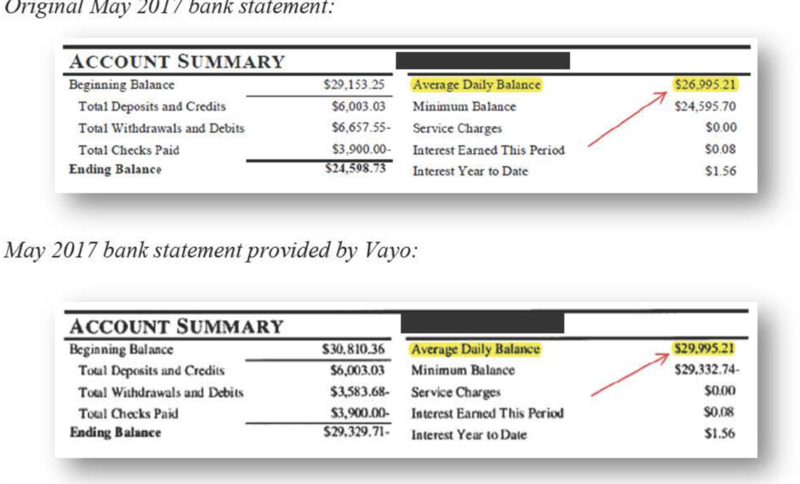






Gordon Vayo Forged Documents In Online Poker Lawsuit, PokerStars ClaimsPoker Player Was Attempting To Recover $600,000 In Winnings, PokerStars Now Countersuing For $280,000 |
|
|

It appears 2016 World Series of Poker main event runner up Gordon Vayo was attempting to run a bluff on PokerStars parent company Rational Entertainment Enterprises Limited (REEL) and got caught.
Vayo, who sued REEL in May 2018, alleged that the site illegally prevented him from cashing out $692,000 in winnings from a high-stakes poker tournament in May 2017.
Vayo’s suit, in which he claimed REEL engaged in a “pattern of fraudulent and unlawful conduct,” was recently dropped by Vayo after PokerStars’ lawyers presented forged bank statements and internet service provider bills that Vayo submitted to argue his case.
In these new court documents filed Nov. 12, REEL is hitting back at Vayo with a $280,000 countersuit.
“Plaintiff Gordon Vayo’s (“Vayo”) bad faith conduct in manufacturing and relying on fraudulent, forged evidence in an attempt to deceive the Court and REEL rises to the level of sanctionable misconduct sufficient for this Court to exercise its inherent authority to grant attorneys’ fees,” the filing states.
Vayo has since dropped his suit against REEL and his original lawyer has resigned from the case.
“As soon as REEL discovered the forgery and confronted Vayo about it, Vayo voluntarily and unconditionally dismissed this action, and his counsel withdrew,” the filing states.
Vayo filed his original lawsuit back in May alleging that PokerStars froze his winnings from a Spring Championship of Online Poker tournament in which Vayo was to pocket $692,460.93. According to the original lawsuit, REEL claimed Vayo was unlawfully playing from his residence in California, while Vayo said he was in Ottawa, Canada. REEL claimed that Vayo connected to the internet via a mobile device from Los Angeles, California more than 50 times between Mar. 24, 2017 and July 31, 2017, that Vayo “used a Canadian mobile internet provider to spoof a Canadian IP address,” and requested that he prove he was physically present in Canada at the time of the event to receive his tournament winnings.
In December 2017, Vayo sent REEL his internet service provider bills (Bell Canada) and bank account statements (First Republic Bank) to prove he was entitled to the winnings.
“REEL later learned that these documents were forgeries that Vayo had created to defraud REEL,” the Nov. 12 filing states.
REEL said it received a “tip” from a third party that Vayo’s bank and internet records were altered by a document forger Vayo hired to create the impression that Vayo was in Canada during the SCOOP tournament.


“Perhaps the most telling sign of forgery: The average daily balance in the original May 2017 bank statement received from the third party is $26,995.21,” the Nov. 12 filing states. “In Vayo’s version of the statement, however, the average daily balance is $29,995.21 – identical to the penny, except that Vayo’s version flips a 6 to a 9. A change like this—especially when paired with the fact that the amounts in Vayo’s Account Summary do not sync with the amounts in his transaction log—is a clear sign of forgery.”
PokerStars, the world’s largest online poker site, is not legally allowed to offer online poker to people located in California. In the United States, the site has made a return to the New Jersey online poker market and can serve customers located in that state.
The Nov. 12 countersuit calls for Vayo to pay at REEL at least $280,000, stating “REEL is thus the prevailing party in Vayo’s frivolous lawsuit, and it is entitled to recover its fees and costs pursuant to (1) the Court’s inherent authority to sanction bad-faith conduct; (2) the terms of the contract on which Vayo sued, which require Vayo pay REEL’s fees in these circumstances; and (3) Isle of Man law, which governs this dispute and as a general rule awards fees to the prevailing party. REEL’s motion should be granted, and it should be awarded $279,347.40 (plus whatever it spends related to this motion), the reasonable amount of its attorneys’ fees; as well as $8,641.08, the nontaxable costs REEL has incurred to date (REEL seeks taxable costs in a separate application).”
